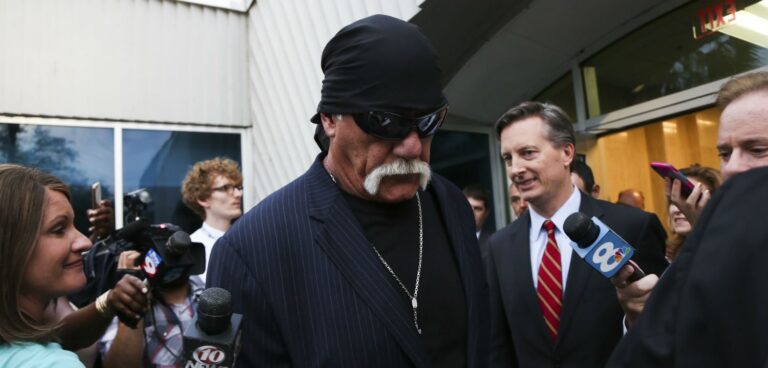When Gawker Media made the decision to post excerpts from a sex tape featuring iconic pro wrestling superstar Hulk Hogan, they couldn’t have anticipated that it would ultimately lead to financial ruin and the shuttering of their infamous blog. But in the aftermath of the multi-million dollar lawsuit came a startling revelation about a Silicon Valley figure pursuing a personal vendetta against Gawker by funding Hogan’s legal fees, and it’s this story that serves as the basis for Brian Knappenberger’s compelling documentary Nobody Speak: Trials of the Free Press.
Premiering this weekend on Netflix after well-received screenings at several festivals, including Sundance and SXSW, Nobody Speak features numerous interviews with some of the key players in the Hogan trial, including former Gawker writer A.J. Daulerio, who posted the tape, and editor Nick Denton. The latter seemingly feels no remorse over this or the numerous other decisions made under his tenure that led to strained relationships between the site and several prominent public figures. “The world is mean sometimes,” he says, as if offering some kind of justification for taking someone’s private moments and exposing them for public consumption.
But whether or not you agree with the notion that one of the most recognizable athletes in the world engaging in a tryst with his friend’s wife – who allegedly recorded the encounter without the wrestler’s consent – is “newsworthy,” there’s a larger narrative at play here, that of influential billionaire Peter Thiel using his influence to snuff out the voice of a website that had been intensely critical of his business dealings – not to mention previously outing him as gay. Thiel’s sexuality was the sort of secret that everyone knew, but no one spoke about – until Gawker put his business on Front Street, effectively signing their death warrant in the process. The systematic burying of the site in legal fees and the staggering $140 million in damages awarded by the jury led to a bankruptcy filing, and Gawker dissolved shortly afterward, with Thiel admitting his involvement after the ashes had settled.
The first half of Nobody Speak is fascinating in both tawdriness and absurdity, especially during courtroom footage where Hogan and his attorneys draw a distinction between the Hulk Hogan persona, on display in interviews and public appearances, and the real-life Terry Bollea, who differs from the character he portrays in everything from personality to penis size. When asked to clarify a conversation about the latter that took place on the Howard Stern show, the wrestler explains without a trace of irony that he was discussing the size of Hulk Hogan’s penis, and not the size of Terry Bollea’s penis, which he insists (under oath) is less than the 10 inches he bragged about to Stern and his listeners.

The film’s second half explores the purchase of the Las Vegas Review Journal by billionaire casino mogul Sheldon Adelson, who sought to mask his involvement by conducting the sale through a network of investors working on his behalf. Adelson already had a contentious relationship with a star columnist who had exposed some of the shady backroom dealings that built his empire, and when the journalists at the Review Journal revealed the truth about their new owner, Adelson banned its most seasoned reporter from writing any further columns about him, which laid the foundation for the eventual dismantling of the news team.
While less salacious than the film’s opening salvo, this story nevertheless draws a clear parallel between the actions of Thiel and Adelson, wealthy magnates attempting to control their own narratives by suppressing editorial content that paints them in a less than favorable light. It’s not dissimilar to the rhetoric of President Trump (featured heavily during the third act), who denounces any negative press coverage as “fake news” and promised during his campaign to “open up the libel laws” to allow for journalists and media outlets to be sued – a vow that has thankfully yet to be fulfilled.
Nobody Speak stumbles a bit as it transitions between its two key narratives, but the overall impact of the documentary and its message is strong. Freedom of the press is a cornerstone of democracy, and the prospect of that voice being silenced by someone with nearly unlimited wealth and influence is a frightening reality that lies just over the horizon. And although Nobody Speak offers no real solution to prevent similar events from occurring, it serves as a sobering admonishment to remain vigilant.
Brian Knappenberger's compelling and sometimes uneven documentary is nevertheless a fascinating and terrifying exploration of the rich and powerful using their influence to suppress the voice of the free press.
-
Score8

